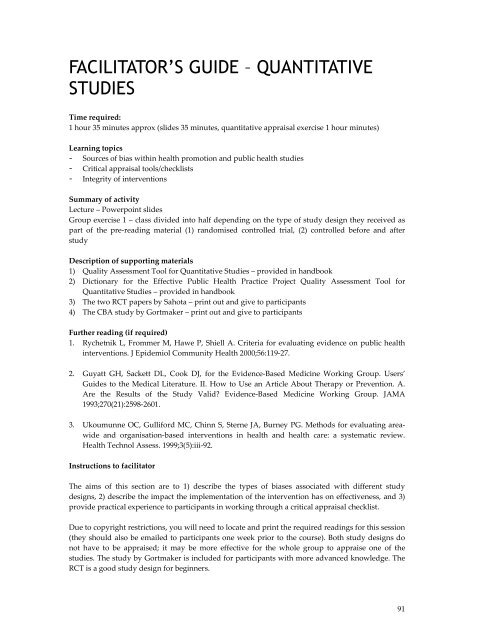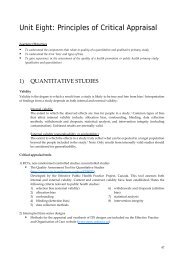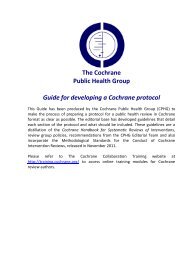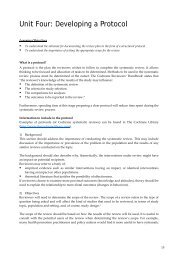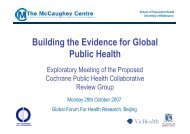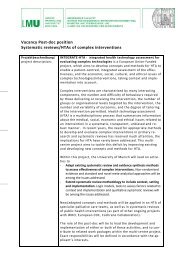Train the Trainer Course book - Cochrane Public Health Group
Train the Trainer Course book - Cochrane Public Health Group
Train the Trainer Course book - Cochrane Public Health Group
Create successful ePaper yourself
Turn your PDF publications into a flip-book with our unique Google optimized e-Paper software.
FACILITATOR’S GUIDE – QUANTITATIVE<br />
STUDIES<br />
Time required:<br />
1 hour 35 minutes approx (slides 35 minutes, quantitative appraisal exercise 1 hour minutes)<br />
Learning topics<br />
- Sources of bias within health promotion and public health studies<br />
- Critical appraisal tools/checklists<br />
- Integrity of interventions<br />
Summary of activity<br />
Lecture – Powerpoint slides<br />
<strong>Group</strong> exercise 1 – class divided into half depending on <strong>the</strong> type of study design <strong>the</strong>y received as<br />
part of <strong>the</strong> pre-reading material (1) randomised controlled trial, (2) controlled before and after<br />
study<br />
Description of supporting materials<br />
1) Quality Assessment Tool for Quantitative Studies – provided in hand<strong>book</strong><br />
2) Dictionary for <strong>the</strong> Effective <strong>Public</strong> <strong>Health</strong> Practice Project Quality Assessment Tool for<br />
Quantitative Studies – provided in hand<strong>book</strong><br />
3) The two RCT papers by Sahota – print out and give to participants<br />
4) The CBA study by Gortmaker – print out and give to participants<br />
Fur<strong>the</strong>r reading (if required)<br />
1. Rychetnik L, Frommer M, Hawe P, Shiell A. Criteria for evaluating evidence on public health<br />
interventions. J Epidemiol Community <strong>Health</strong> 2000;56:119-27.<br />
2. Guyatt GH, Sackett DL, Cook DJ, for <strong>the</strong> Evidence-Based Medicine Working <strong>Group</strong>. Users’<br />
Guides to <strong>the</strong> Medical Literature. II. How to Use an Article About Therapy or Prevention. A.<br />
Are <strong>the</strong> Results of <strong>the</strong> Study Valid? Evidence-Based Medicine Working <strong>Group</strong>. JAMA<br />
1993;270(21):2598-2601.<br />
3. Ukoumunne OC, Gulliford MC, Chinn S, Sterne JA, Burney PG. Methods for evaluating areawide<br />
and organisation-based interventions in health and health care: a systematic review.<br />
<strong>Health</strong> Technol Assess. 1999;3(5):iii-92.<br />
Instructions to facilitator<br />
The aims of this section are to 1) describe <strong>the</strong> types of biases associated with different study<br />
designs, 2) describe <strong>the</strong> impact <strong>the</strong> implementation of <strong>the</strong> intervention has on effectiveness, and 3)<br />
provide practical experience to participants in working through a critical appraisal checklist.<br />
Due to copyright restrictions, you will need to locate and print <strong>the</strong> required readings for this session<br />
(<strong>the</strong>y should also be emailed to participants one week prior to <strong>the</strong> course). Both study designs do<br />
not have to be appraised; it may be more effective for <strong>the</strong> whole group to appraise one of <strong>the</strong><br />
studies. The study by Gortmaker is included for participants with more advanced knowledge. The<br />
RCT is a good study design for beginners.<br />
91


